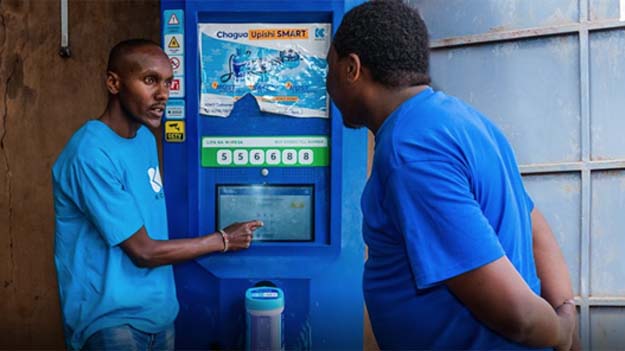 In Kenya’s capital Nairobi, a new set of ATMs are now found in stores around the city. Unlike traditional ATMs however, which dispense cash, these ones dispense an ecofriendly cooking fuel intended to drive down household pollution, decrease environmental impacts and reduce negative health outcomes. They’re part of a climate friendly intervention by KOKO Networks to provide a cheap alternative to charcoal, a key pollutant, which has made up 70% of domestic energy demand for cooking and heating in Kenya.
In Kenya’s capital Nairobi, a new set of ATMs are now found in stores around the city. Unlike traditional ATMs however, which dispense cash, these ones dispense an ecofriendly cooking fuel intended to drive down household pollution, decrease environmental impacts and reduce negative health outcomes. They’re part of a climate friendly intervention by KOKO Networks to provide a cheap alternative to charcoal, a key pollutant, which has made up 70% of domestic energy demand for cooking and heating in Kenya.
Charcoal has traditionally been the cheap and easy to access fuel of choice for many Kenyans. Their vendors visited homes to sell their product at a cheaper rate. KOKO’s alternative bio-ethanol fuel made of sugarcane, puts it in the hands of local Kenyans at a 40% lower rate than charcoal and can be found at one of over 700 ATM machines in the city meaning both issues can be addressed. Another thing considered by KOKO is spending capacity. “People are used to being able to buy daily necessities little by little, or in small chunks,” says KOKO’s co-founder and CEO Greg Murray. “It is how we have to sell vital commodities in Africa: It is not a CostCo culture where people buy three months’ worth of a product. Africans have uncertain daily incomes.”
Household pollution from cooking fuels such as charcoal and kerosene, which causes smoke, are associated with devastating health effects on ordinary Kenyans. According to the Kenyan Health Department, it is estimated that 23,000 Kenyans, or on average 440 per week, died from household air pollution in 2020. Charcoal is also a leading driver for deforestation in Africa adding to the urgent need for change.
Switching from charcoal prevents five tonnes of carbon dioxide per household per year, leads to considerably better health outcomes and it’s cheaper too. The progress so far has been noticed by other countries in the region with KOKO planning to expand operations into six more African countries in the next six years helping to deliver a modern, clean and safe fuel commodity for many more consumers.
